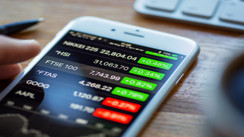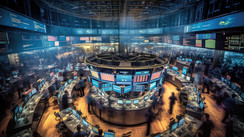Understanding the Essence of DAX 30 Index
The DAX 30 Index, colloquially known as the DAX, represents the financial prowess of Germany's economy. It acts as a beacon, highlighting the top-performing corporations that play a pivotal role in the Frankfurt Stock Exchange. Companies such as Adidas and Bayer stand tall among these giants. However, the DAX is more than just a collection of companies; it is a reflection of both Germany's domestic and global economic stance. Investors globally rely on the DAX not only for insights but also to make informed decisions in their investment ventures.
The Structure and Relevance of DAX
The DAX isn't just another index in the world of finance. As a premium blue-chip stock index, it provides an accurate representation of Germany's financial backbone. The DAX comprises the 30 most influential and actively traded companies listed on the Frankfurt Stock Exchange. Through its capitalization-weighted structure, it ensures that each company's significance is directly proportionate to its market value, offering a balanced insight into Germany's corporate landscape.
Note: To ensure fair representation and to avoid any monopolization, no single entity is allowed to exceed 10% of the entire DAX market capitalization.
Delving into the DAX’s Historical and Functional Canvas
Safeguarded by the renowned Deutsche Börse Group, the DAX boasts a rich legacy dating back to July 1, 1988. It is an integral part of a broader family of indices, highlighting its collaborative nature in the global financial ecosystem.
DAX's Global Significance and its Utility for Investors
Many of the DAX's constituents are not just significant within Germany but have a global footprint. They have marked their presence across continents, influencing markets and shaping industries. Representing approximately 80% of the total market cap of German-listed companies, the DAX serves as a primary benchmark for investors across the world.
Comparing the DAX to the American Dow Jones Industrial Average can shed light on its importance. Just as the DJIA is an indicator of the U.S. economic health, the DAX offers insights into both German and global economic health. Investors can analyze the performances of its constituents, identifying market trends, risks, and opportunities, thereby refining their investment strategies.
Stringent Criteria and Regular Monitoring: Keeping DAX Relevant
Being a part of the DAX isn't a cakewalk. Companies undergo rigorous scrutiny against a set of well-defined criteria before making the cut. These metrics ensure the index remains relevant and representative of the current economic landscape. Regular revisions ensure the DAX remains updated, reflecting contemporary market dynamics and business landscapes.
Real-Time Analysis with Xetra Prices
Through Xetra prices, the DAX offers real-time insights. Investors can view the index in two distinct lights: one that focuses purely on stock prices and another that provides a more holistic view by integrating dividends and bonus yields.
The DAX Portfolio: A Closer Look at Its Constituents
Peeling back the layers, the DAX is a harmonious blend of 30 distinct entities, each a titan in its respective industry. From Adidas AG's dominance in the sportswear industry to Bayer AG's pioneering strides in healthcare, each company is a chapter in a larger narrative of success and global impact.
Investing in the DAX: Charting the Financial Waters with Panache
The allure of investing in the heart of Europe's economic powerhouse is undeniable. Yet, venturing into Germany's DAX requires not just enthusiasm but a blend of prudence, strategy, and discernment. After all, we're treading into the territory of global titans. Whether you're an experienced trader or new to the financial world, understanding the intricacies of the DAX is paramount. Here's how to navigate this investment journey with both style and substance:
The Two Main Avenues: Direct and Indirect
Direct Investment:
- Dive Deep: For those with an appetite for direct involvement, consider investing in individual constituents of the DAX. Many of these companies, like Adidas AG and Bayer AG, have robust global footprints, offering a dual advantage of brand familiarity and financial stability.
- Brokerage Requirements: However, tread cautiously. Many DAX constituents may not trade as ADRs in the U.S. Hence, you might need a global or international brokerage account to make your investments.
Indirect Investment:
- ETFs - The Elegant Alternative: For those seeking a broader exposure without getting entangled in individual stock nuances, Exchange Traded Funds (ETFs) are your go-to. They provide a convenient vehicle to invest in a spectrum of DAX companies, balancing risk and reward.
ETFs at a Glance: Top Picks for the Discerning Investor
Navigating the myriad of ETF options can be daunting, but a discerning eye will spot the gems. Here are some standout options:
-
iShares Core DAX UCITS ETF (FRA: EXS1): A popular choice, this ETF is renowned for its diversified approach and its deep-rooted association with the core companies of the DAX.
-
X-Trackers DAX UCITS ETF (FRA: DBXD): Offering an optimal blend of performance and stability, it's a favourite among those who seek a balanced portfolio.
-
Lyxor DAX UCITS ETF (FRA: LYY7): A name that resonates with style and elegance, Lyxor provides a unique investment perspective, intricately weaving the top DAX constituents.
-
Deka DAX UCITS ETF (FRA: EL4A): As an emerging star in the ETF world, Deka promises robust returns and offers a fresh lens to view the DAX portfolio.
Tip: Diving into the prospectus of each ETF, understanding its investment strategy, fee structure, and historical performance, can pave the way for a well-informed decision.
The Finer Details: Things to Consider
-
Diversity is Strength: While the DAX is a formidable index, it's wise to diversify your portfolio. Look beyond Germany and consider other European markets to spread risks.
-
Stay Updated: The DAX is dynamic. Regularly monitor changes, quarterly reviews, and market news to stay ahead of the curve.
-
Long-term vs Short-term: Have clarity on your investment goals. Whether you're in for a quick trade or a long-term investment, align your strategies accordingly.
In conclusion, investing in the DAX is both an art and a science. Approach it with curiosity,
Alternatives and Complementary Investments to the DAX
While the DAX provides a direct window into Germany's economic engine, diversifying investment portfolios is always a prudent strategy. Multiple ETFs, apart from the DAX, offer exposure to the German market. Analyzing these funds' weightage, performance metrics, and associated expenses can aid investors in making well-informed choices.





